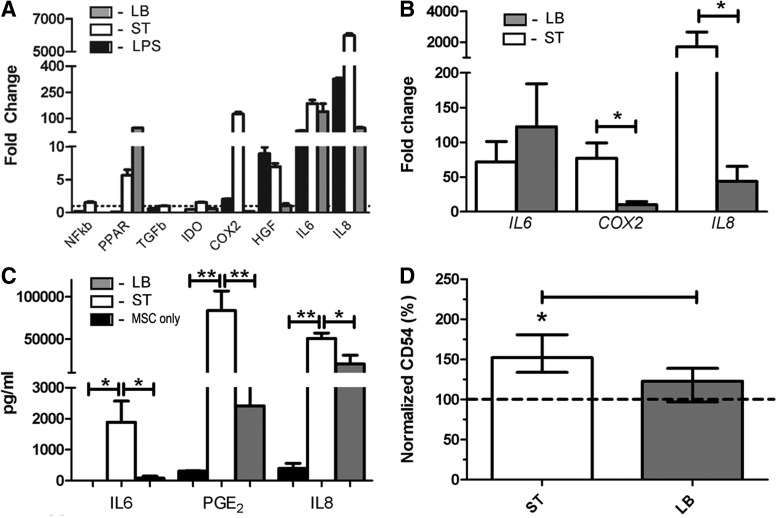FIG. 3.
MSCs are activated by intestinal bacteria and upregulate transcription, translation, and cell surface expression of key immunomodulatory genes and mediators, respectively. MSCs were coincubated with ST and LB per protocol prior to cell lysis, RNA extraction, and qPCR. For inflammatory mediator determination, MSCs were further cultured for 4 days, media were harvested, and specific cytokine was determined via ELISA. For cell immunophenotyping experiments, MSCs were cultured for 24 h post-microbial coincubation protocol prior to imunophenotype determination via flow cytometry. Initial gene expression screening experiments (A) were done with one MSC line plated in triplicates. Both organisms induced increased expression of peroxisome proliferator activator receptor gamma (PPARγ), interleukin (IL)6, and IL8 while cyclooxygenase 2 (COX2) and hepatocyte growth factor (HGF) transcription were induced by ST, but not by LB. Lipopolysaccharide (LPS) treatment mostly mirrored ST treatment. Nonetheless, while ST induced a marked increase in COX2 expression, LPS treatment did not induce a similar effect. IL1β transcription was not detected in canine MSCs with any of the treatments. We next determined the transcription of selected genes in four more MSC lines (B). Both bacteria induced upregulation of IL6, IL8, and COX2 gene transcription. Moreover, transcription of IL8 and COX2 genes was statistically significantly higher in the ST-treated MSCs compared with the LB-treated MSCs. Secreted factors followed gene transcription trends and IL6, IL8, and PGE2 concentrations were higher in the ST-primed MSCs than baseline or LB-primed MSCs (C). Cell surface expression of CD54 was significantly induced by ST compared with baseline and LB-treated MSCs (D). LB interaction did not induce any change in CD54 cell surface expression. *P<0.05, **P<0.01.

